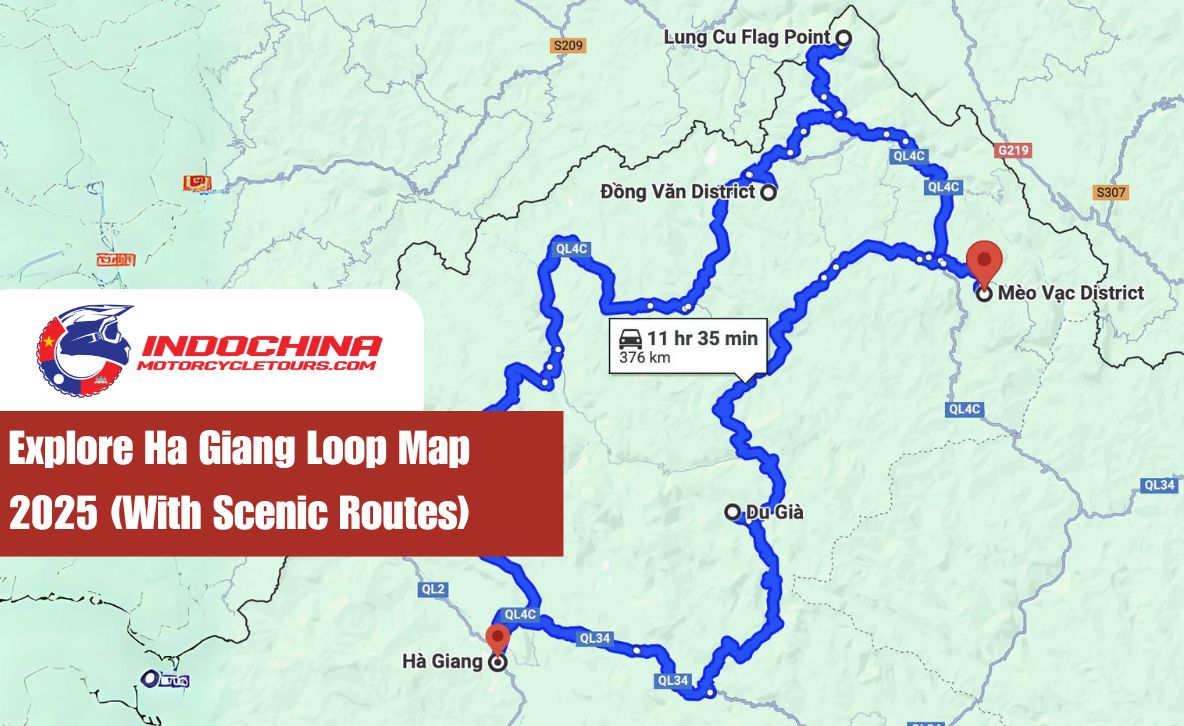Nestled between the bustling cities of Da Nang and Hue, the Hai Van Pass is renowned as one of Vietnam’s most scenic coastal routes. With its breathtaking views, winding roads, and rich history, it offers travelers an unforgettable journey. Whether you’re an adventurous motorcyclist or a casual traveler, these Hai Van Pass travel tips will help you conquer the Hai Van Pass and experience the best it offers.
Hai Van Pass history
Hai Van Pass, often called the “Sea Clouds Pass,” is a legendary route that winds through Vietnam’s central coastline. This 21-kilometer stretch of road, renowned for its dramatic landscapes and breathtaking views, connects the vibrant cities of Da Nang and Hue, making it an essential stop on any Vietnam itinerary.
This iconic pass of Vietnam holds historical significance. It traditionally served as a geographic boundary between the ancient kingdoms of Champa and Dai Viet. Remnants of a gate that once marked the border between the two kingdoms can still be seen, adding a layer of cultural intrigue to the journey.
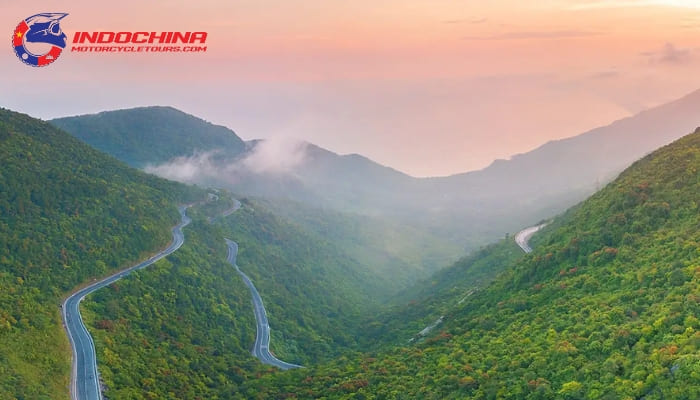
A breathtaking panoramic view of the Hai Van Pass
As you ascend the pass, a sense of adventure builds with each hairpin turn, revealing panoramic vistas of lush mountains cascading down to the turquoise waters of the East Sea. This iconic route has captured the hearts of travelers for generations, offering a unique blend of natural beauty, cultural significance, and thrilling adventure. Whether you’re a seasoned explorer or a first-time visitor seeking Hai Van Pass travel tips, this coastal jewel promises an unforgettable journey through one of Vietnam’s most treasured landscapes.
Where to begin your Hai Van Pass journey?
One of the first Hai Van Pass travel tips to consider is where to begin your journey. There are three main options, each with its unique charm and advantages:
- Hoi An: This UNESCO World Heritage town is known for its well-preserved ancient architecture, charming lanterns, and vibrant atmosphere. Starting your Hai Van Pass adventure from Hoi An allows you to explore its enchanting streets and soak in its rich history before embarking on the scenic drive.
- Da Nang: A bustling coastal city, Da Nang offers a modern counterpoint to Hoi An’s old-world charm. With its stunning beaches, vibrant nightlife, and diverse culinary scene, Da Nang provides a lively base for your Hai Van Pass exploration.
- Hue: As the former imperial capital of Vietnam, Hue city is steeped in history and culture. Its magnificent citadel, royal tombs, and traditional cuisine offer a fascinating glimpse into the country’s past. Starting from Hue allows you to delve into its historical treasures before venturing onto the scenic route.
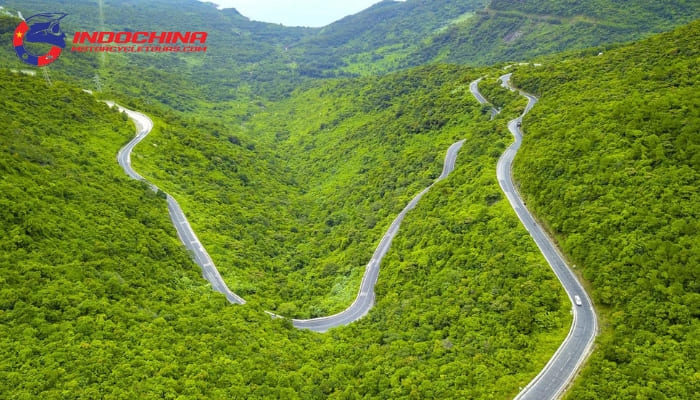
No matter where you start your journey, the views along the way still stunning
Whether you start in the south (Hoi An or Da Nang) and head north to Hue, or vice versa, the scenery and experience will be equally rewarding. The choice ultimately depends on your overall itinerary and preferences.
How to travel the Hai Van Pass: Modes of transport
When it comes to conquering the Hai Van Pass, there are several exciting options to suit your comfort level and budget. Each mode of transport offers will a unique perspective and experience for your journey:
- Rent a Motorbike: For many adventurers, renting a motorbike is the most thrilling way to experience the Hai Van Pass. It gives you the freedom to explore at your own pace, stop at scenic viewpoints whenever you like, and truly feel the wind in your hair as you navigate the winding road.
- Motorcycle Tours: If you crave the thrill of riding a motorbike but prefer the camaraderie and expertise of a group, consider joining motorcycle adventure tours of Indochinamotorcycletours.com. These tours often include experienced guides, well-maintained bikes, and pre-planned routes that showcase the best of the Hai Van Pass and surrounding areas. It’s a great way to meet fellow riders, learn about the local culture, and have a support system in case of any unexpected situations.
- Car or Taxi: For a more comfortable and relaxed journey, consider renting a car or taking a taxi. This is a great choice for families or groups who want to enjoy the scenic views without the physical exertion of driving.
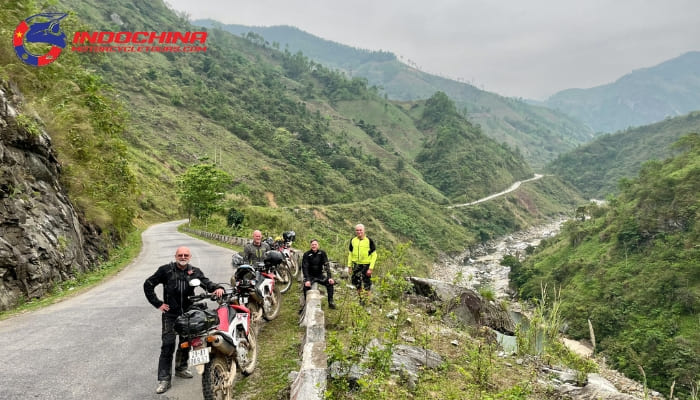
Choose the type of vehicle that suits your abilities
Tips for motor rental at Hai Van Pass
Renting a motorbike is one of the best ways to experience the thrill and beauty of Hai Van Pass during Hai Van Pass Motorbike Tours. However, it’s important to be prepared and informed to ensure a safe and enjoyable ride. Here are some essential Hai Van Pass travel tips for motorbike rentals to help you make the most of your journey:
- Thoroughly Inspect Your Bike: Before leaving the rental shop, give your motorbike a thorough once-over.
- Brakes and Lights: Test the brakes to ensure they respond well and check that all lights are functioning correctly.
- Tires: Examine the tires for any signs of wear and tear. Adequate tread is crucial for maintaining traction and avoiding punctures or skids on the winding roads.
- Document Existing Damage: If you notice any scratches, dents, or other damage on the bike, take photos as proof. This will protect you from being unfairly charged for pre-existing issues upon returning the bike.
- Insist on a Helmet: Wearing a helmet is not only a legal requirement in Vietnam but also an essential safety precaution. Your rental shop should provide one, but if not, be sure to find one elsewhere. It could save your life!
- Insurance Coverage: Verify that your travel insurance policy covers motorbike riding. It’s also a good idea to check if the rental shop offers additional insurance options for added peace of mind.
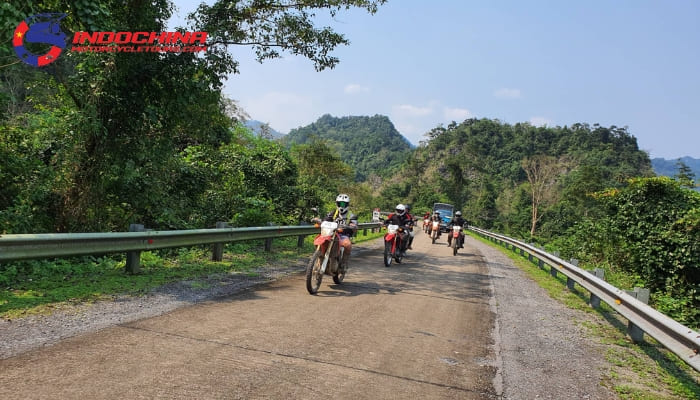
Pay attention to the limit speed while driving
Tips for driving the Hai Van Pass by motorbike
Driving the Hai Van Pass by motorbike is an exhilarating experience that offers unparalleled views of Vietnam’s coastline and mountains. However, the winding roads and variable weather conditions can pose challenges even for experienced riders. To ensure a safe and enjoyable trip, follow these essential Hai Van Pass travel tips:
- Fuel Up: Fill your tank completely in Hoi An, Da Nang, or Hue. There are no petrol stations along the pass, so you don’t want to get caught short.
- Watch for Blind Corners: Be extra cautious when approaching blind corners, as other vehicles might be speeding around them. Stay alert and keep to your side of the road.
- Check the Weather: Especially during the rainy season, check the forecast before setting off. Heavy rain can make the roads slippery and obscure the stunning views.
- Avoid Early Morning Fog: Wait until the fog lifts, usually around 8-9 a.m., to ensure clear visibility and a safer ride.
- Stay Connected: If you need to stay online during your journey, consider getting an eSIM data plan for Vietnam. This will ensure you have access to maps, communication, and emergency services if needed.
- Check your Map: Familiarize yourself with the route and key landmarks before you start. Whether you’re using a physical map, a GPS device, or a smartphone app, having a clear understanding of the road ahead will help you navigate with confidence.
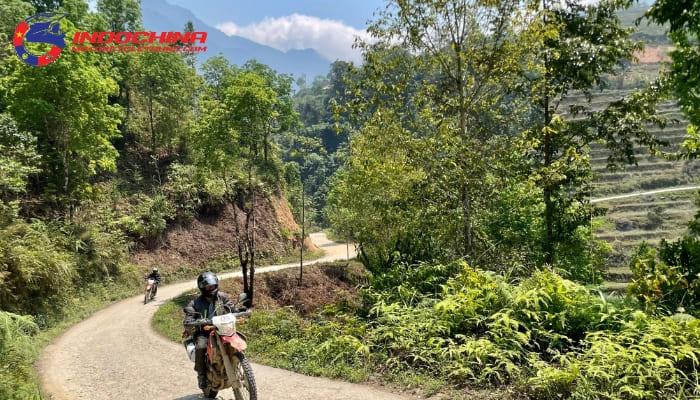
Always check the map to make sure you don’t get lost
Best places on the Hai Van Pass
Now that you’re equipped with essential Hai Van Pass travel tips for your motorbike journey, let’s dive into the best places to explore along this iconic route. Whether you’re starting in Da Nang, Hoi An, or Hue, there are plenty of hidden gems and must-see attractions to enhance your motorbike tour in Vietnam.
Da Nang
If you’re starting your journey in Da Nang, take some time to explore this vibrant city before heading out. Stroll along the picturesque beaches, marvel at the Marble Mountains, and indulge in the city’s lively nightlife. As you leave Da Nang behind and begin your ascent up the Hai Van Pass, the scenery transforms dramatically. The road winds its way through lush greenery, offering glimpses of the azure sea below.
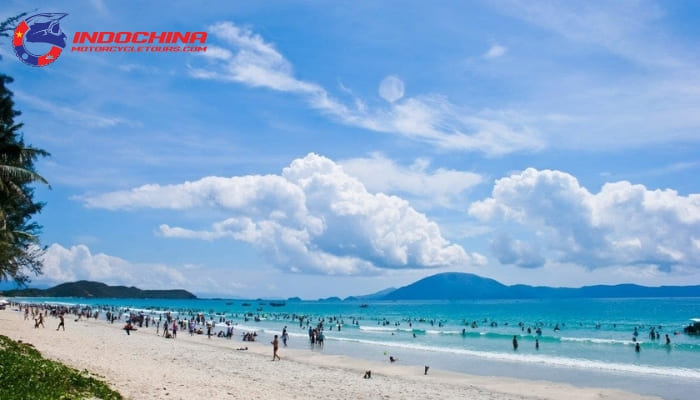
My Khe Beach at Da Nang
Reaching the Hai Van Pass
As you ascend the Hai Van Pass, the scenery transforms dramatically, offering breathtaking panoramic views of the coastline, mountains during Central Vietnam Motorcycle Tours, and surrounding countryside. Be sure to stop at the designated viewpoints along the way to capture stunning photos and soak in the natural beauty. Don’t miss the iconic Hai Van Gate at the summit, a historic landmark that once marked the border between ancient kingdoms. One of the best Hai Van Pass travel tips is to take your time here, soaking in the scenery and capturing stunning photos.
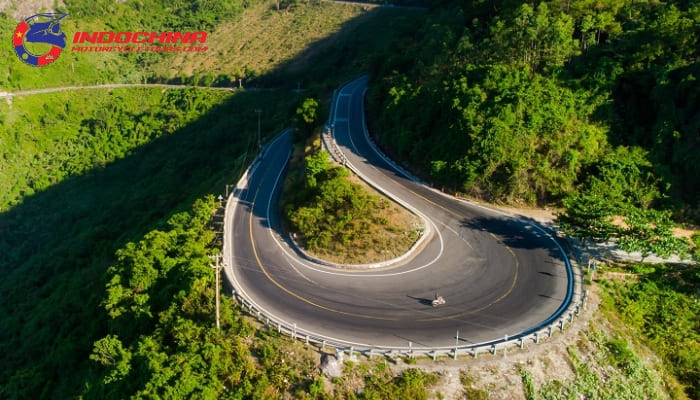
The breathtaking and impressive beauty of Hai Van Pass
Lap An Lagoon & the sand dune road
For a truly unique experience, make a detour to Lap An Lagoon and the enchanting sand dune road. This serene lagoon, nestled between the mountains and the sea, is a hidden oasis of tranquility. Take a leisurely walk along the sandy shores, admire the local fishermen at work, or simply relax and soak in the peaceful atmosphere. The nearby sand dune road offers a fun and adventurous detour for those seeking a bit of off-road excitement.
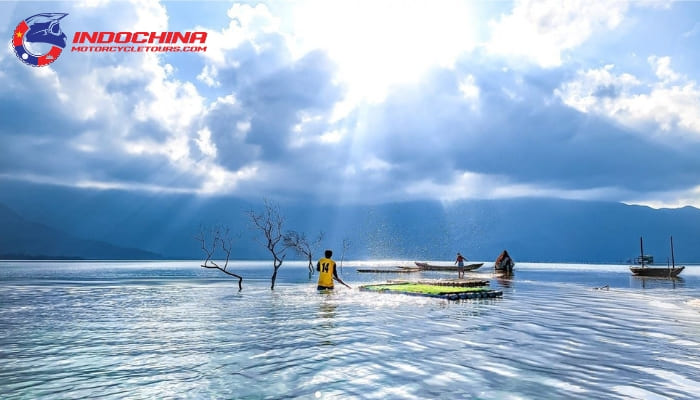
Lap An Lagoon – Hidden Gem through the Hai Van Pass journey
Lunch at Canh Duong Bay
As your journey along the Hai Van Pass continues, a stop for lunch at Canh Duong Bay is a must. This picturesque bay, recommended in many Hai Van Pass travel tips, is a haven for seafood lovers, boasting a variety of charming restaurants that offer fresh catches of the day and stunning views of the coastline. Treat yourself to grilled fish, succulent prawns, or a steaming bowl of seafood noodles, all while enjoying the refreshing sea breeze and breathtaking scenery. It’s the perfect way to refuel and recharge before continuing your Hai Van Pass adventure.
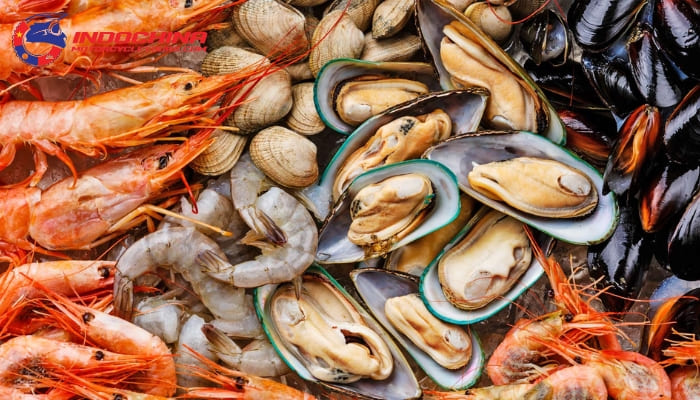
Fresh seafood at Canh Duong Bay
Countryside and buffalo-spotting
Experience the tranquil Vietnamese countryside as you continue your journey. g hills dotted with grazing water buffalo, and charming villages where time seems to slow down. Take a moment to connect with the local people, observe their daily routines, and appreciate the simple beauty of rural life in Vietnam. This is a chance to experience a different side of the country, away from the bustling cities and tourist hotspots. Including this in your Hai Van Pass travel tips is essential for those wanting to capture the true essence of rural Vietnam.
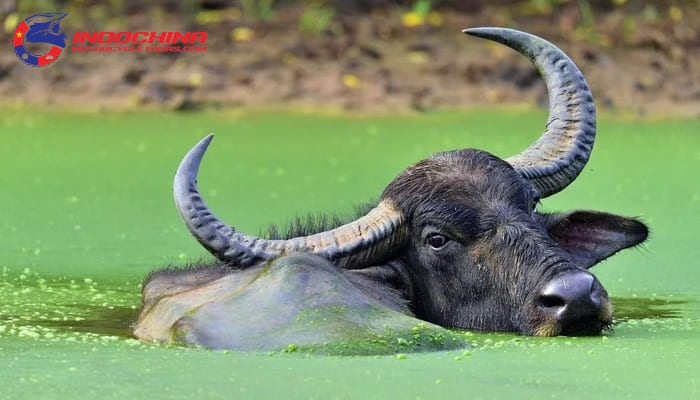
Water buffalo
Dam Cau Hai (Salt Lake)
Dam Cau Hai, one of the largest saltwater lagoons in Southeast Asia, is a captivating stop on your journey through the Hai Van Pass. This expansive lagoon is a remarkable feature of the region’s landscape, offering a unique blend of natural beauty and tranquility. For the best experience, take a leisurely walk along the lagoon’s edge or enjoy a boat ride to fully appreciate the serene environment. The calm waters reflect the sky, creating a stunning visual effect that changes with the light throughout the day.

Discover the expansive beauty of Dam Cau Hai
An Bang Cemetery
An Bang Cemetery, often referred to as the “City of Ghosts,” is a unique and culturally significant stop along the Hai Van Pass. This sprawling cemetery is renowned for its colorful and elaborate tombs, each reflecting the Vietnamese belief in an afterlife and the importance of honoring ancestors. The vibrant hues, intricate designs, and diverse architectural styles of the tombs create a mesmerizing and thought-provoking landscape. A visit to An Bang Cemetery offers a glimpse into Vietnamese funerary traditions and the deep respect for family lineage that is deeply ingrained in the culture.
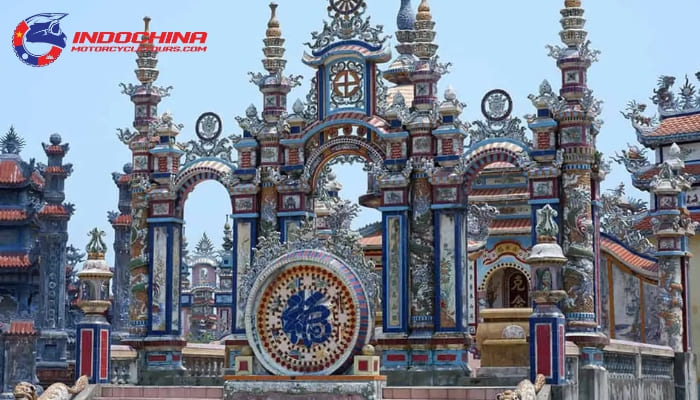
An Bang Cemetery is a unique cultural heritage of the region
Arriving in Hue
Concluding your journey on the Hai Van Pass, you’ll arrive in Hue, Vietnam’s ancient capital and a city renowned for its rich historical and cultural heritage. Hue is a treasure trove of historical landmarks and cultural sites that reflect its storied past as the seat of the Nguyen Dynasty.
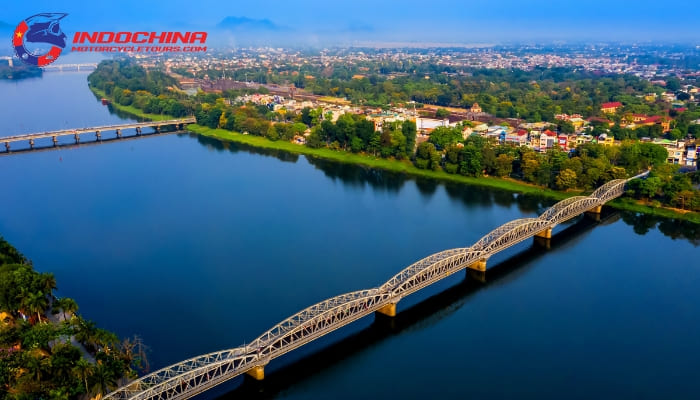
Conclude your journey in the beautiful Hue
Be sure to savor Hue’s unique cuisine, renowned for its delicate flavors and imperial influences. From exploring ancient temples to cruising along the Perfume River, Hue offers a wealth of activities and attractions to discover. This final Hai Van Pass travel tip will help you fully appreciate Hue’s historical and cultural heritage.
>>> read more: Things to do in Hai Van Pass
Best season to drive the Hai Van Pass
Timing is everything when it comes to experiencing the Hai Van Pass at its best. Here are some Hai Van Pass travel tips to help you choose the ideal season for your journey:
Dry Season (April to September):
The dry season is widely considered the best time to tackle the Hai Van Pass. With clear skies, warm temperatures, and minimal rainfall, you’ll enjoy optimal riding conditions and unobstructed views of the stunning scenery. The roads are generally in good condition, making for a smoother and safer ride. This is also the peak tourist season, so expect more crowds and higher prices for accommodations and tours.
Rainy Season (September to March):
While the rainy season brings lush greenery and dramatic cloud formations, it’s not the ideal time for a motorbike adventure on the Hai Van Pass. The roads can become slippery and dangerous, and visibility can be limited due to fog and rain. If you do choose to travel during this time, be extra cautious and prepared for unpredictable weather conditions.
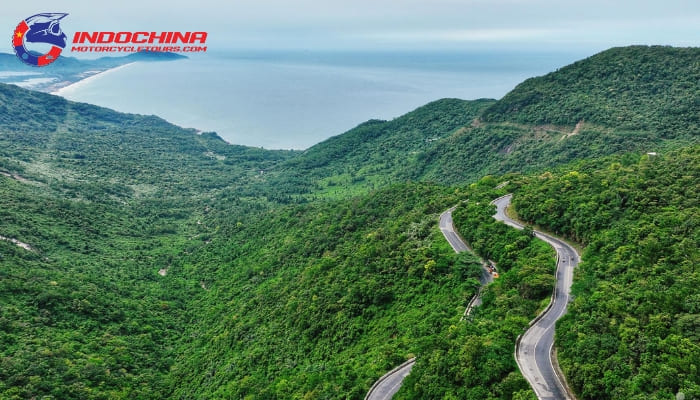
The dry season is the best time to join the journey to Hai Van Pass
No matter when you decide to visit, it’s always wise to check the weather forecast before setting off on your Hai Van Pass adventure. Be prepared for sudden changes in weather during the trip, especially at higher elevations. Pack appropriate rain gear and warm clothing, even during the dry season, as temperatures can drop significantly as you ascend the pass.
With these comprehensive Hai Van Pass travel tips, you’re well-equipped to embark on an unforgettable journey through one of Vietnam’s most iconic landscapes. By incorporating these tips into your itinerary, you’ll be able to confidently navigate the pass, discover hidden gems, and create lasting memories. So pack your bags, fuel up your bike, and embark on a Hai Van Pass adventure with Indochinamotorcycletours.com that will leave you in awe of Vietnam’s natural beauty and cultural heritage. Safe travels and enjoy your trip!

